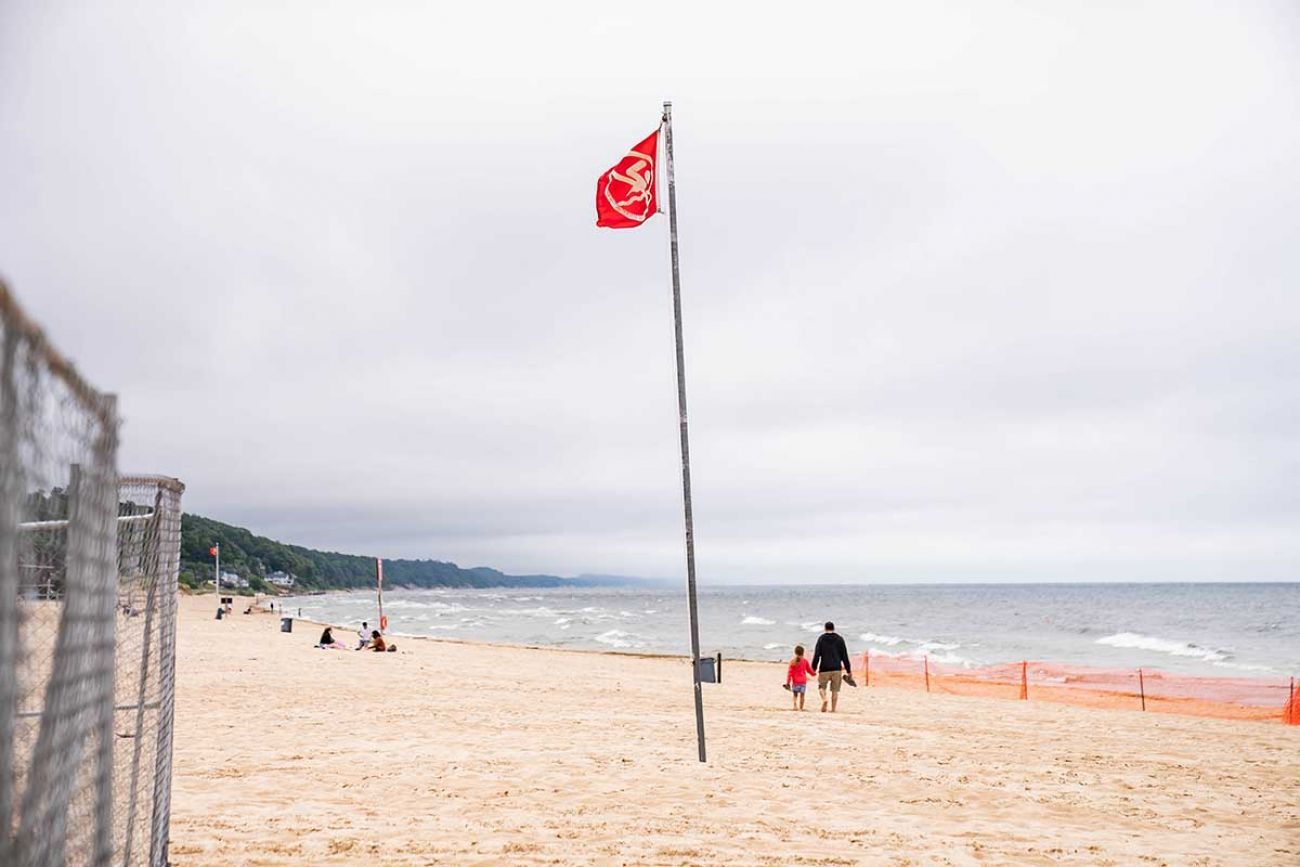Michiganders to face tickets next spring for swimming in dangerous waves

Starting next spring, swimmers who venture into the water on state beaches despite dangerous waves, debris or water contamination could be cruising for a fine.
Dan Eichinger, director of the Michigan Department of Natural Resources, signaled this week that he will approve a new policy giving DNR officials the power to ban swimming when beach conditions pose a “human health and safety risk,” and ticket those who enter the water during a ban, though an exception will be added for surfers.
The policy, a revised version of a proposal first floated earlier this summer, aims to remedy a problem that has vexed state officials: Swimmers frequently ignore beach dangers, sometimes with deadly consequences.
Related:
- People ignore drowning warnings, so Michigan may close Great Lakes beaches
- Great Lakes surfers to Michigan: Don’t close beaches during rough waves
- Great Lakes drownings an ‘epidemic.’ Meet a Michigan man obsessed with ending them.
- Emergencies surge at northern Michigan parks, lakes. Time for a rescue tax?
Last summer, for example, beachgoers in Grand Haven had to be rescued after waves swept them off a Lake Michigan pier. The next day, a 14-year-old boy drowned in the same area during rough conditions.
There have been 78 drownings so far this year in the Great Lakes, compared to 82 by this time last year, according to statistics from the nonprofit Great Lakes Surf Rescue Project. Nearly half of this year’s drownings have been in Lake Michigan, which is known as the most dangerous Great Lake because of its combination of frequently-perilous water conditions and heavy visitation.
Despite the danger, DNR staff wrote in a memo discussing the proposed policy, swimmers sometimes remain in the water even while crews are attempting to rescue a drowning swimmer nearby.
At present, the best state beach managers can do to prevent those tragedies is issue warnings. Many beaches across Michigan use a flag system to signal water conditions: A red flag means it’s not safe to swim.
“We’ve added loudspeakers, we’ve added bigger message signs when you come into the park, and we’ve tried to create more visibility for the red flags,” DNR Parks and Recreation Chief Ron Olson said Friday. But for the small minority of beachgoers who still insist upon swimming, “this will be a helpful tool.”
The new policy, which takes effect in May, applies only to state-owned beaches. It would not apply to local parks, national lakeshores, privately owned coastal land or other non-state beaches.
State officials have not yet spelled out how big the fines may be, nor whether repeat offenders will face harsher penalties.
It represents a compromise between DNR and Great Lakes surfers, who complained that an earlier proposal would have deprived them of the opportunity to catch the most exciting waves.
The new rules won’t apply to surfers, kiteboarder and boogie boarders, so long as they follow “commonly accepted safety rules and procedures.”
That’s welcome news to the state’s surfing community, said Mark Cox, an avid Holland surfer who is on the board of a nonprofit that promotes surfing as a healing activity for military veterans. Cox said the new policy adds needed restrictions to protect novice swimmers, while acknowledging that many surfers are skilled enough to stay safe in rough waters.
“Red flag days are the best days to go surfing, because that’s when the waves are there,” Cox said. “It’s therapeutic, and I’m glad the DNR made the exemption for it.”
Beyond high waves, the order gives DNR officials the power to ban swimming during other times of “human health and safety risk,” including when debris in the water poses a danger to swimmers, and when bacteria or other contaminants pose a health risk.
At a Michigan Natural Resources Commission meeting Thursday, Natural Resources Commission Chair Carol Rose lauded the policy as an example of compromise.
“Kudos should go out to the department and the surfing community to be able to find some middle ground on this,” Rose said.
Dave Benjamin, a co-executive director of the Rescue Project, called DNR’s new policy a good step, but no substitute for taking additional steps to make sure popular beaches are closely monitored by trained lifeguards.
As Bridge has documented, many Great Lakes beaches lack lifeguards, including the beaches at Michigan’s state parks. Benjamin said hiring lifeguards would be a more effective water safety tool than adding new rules that may be difficult to enforce.
“This is a tool for lifeguards to use,” Benjamin said, “not a replacement for lifeguards.”
Michigan Environment Watch
Michigan Environment Watch examines how public policy, industry, and other factors interact with the state’s trove of natural resources.
- See full coverage
- Subscribe
- Share tips and questions with Bridge environment reporter Kelly House
Michigan Environment Watch is made possible by generous financial support from:
Our generous Environment Watch underwriters encourage Bridge Michigan readers to also support civic journalism by becoming Bridge members. Please consider joining today.
See what new members are saying about why they donated to Bridge Michigan:
- “In order for this information to be accurate and unbiased it must be underwritten by its readers, not by special interests.” - Larry S.
- “Not many other media sources report on the topics Bridge does.” - Susan B.
- “Your journalism is outstanding and rare these days.” - Mark S.
If you want to ensure the future of nonpartisan, nonprofit Michigan journalism, please become a member today. You, too, will be asked why you donated and maybe we'll feature your quote next time!






